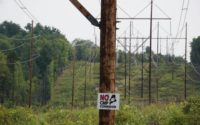Clean Energy Construction
Maine Judge Nixes $1B Hydropower Project Restart for Now

A Maine civil court judge has denied utility Central Maine Power’s request to reconsider a work shutdown order so it can complete construction of a $1-billion hydropower transmission line through western Maine.
The Oct. 21 ruling follows an August decision by the state supreme court. That court ruled as unconstitutional a November 2021 ballot referendum to halt construction of the New England Clean Energy Connect project, allowing work to proceed if the utility proves it had "vested rights" to complete construction based on what it has finished so far.
That issue must be decided by lower court Judge Michael Duddy in a trial next April. NECEC has warned the court "about an approaching tipping point” after which project completion would be at risk financially.
The 145-mile New England Clean Energy Connect project would deliver up to 1,200 MW of hydropower from Quebec through western Maine to supply Massachusetts, as part of its clean energy plan.
“While disappointed with today’s ruling by the court, the project remains confident that the full legal process will conclude that the referendum designed to block its construction is unconstitutional,” an NECEC spokesperson says. “NECEC will benefit Maine and all New England by reducing the region’s dependence on fossil fuels which will result in lower energy prices for Mainers, cleaner air, and improved reliability.
Central Maine Power has said that it has already invested $450-million to develop the project.
In an Oct. 25 quarterly results call, Catherine Stempien, CEO of Avangrid Networks, parent of its utility developer, told investors that construction would start “soon after the end of the trial” and that the company hopes to have the project in service by 2024.
But opponents reject the loss of forest in western Maine. While the project primarily follows existing utility corridors, a new 53-mile section had to be cut to reach the Canadian border.
There are no referendums on the 2022 ballot related to the Central Maine Power corridor, says Sandi Howard, spokesperson for the nonprofit Say No to NECEC, which is opposed to large-scale industrial development in western Maine.
With the CMP hydropower corridor project hitting legal roadblocks, Gov. Charlie Baker (R-Mass) ’s energy office stated in July that the corridor is “a critical component of the state’s energy future" but reaching its net-zero emissions goal by 2050 will require addition renewable power sources.
Some alternatives policymakers are assessing include Con Edison’s Maine Power Link in northern Maine, that would also generate 1,200 MW of power. The Maine Public Utilities Commission is expected to select a bid by November.
The NECEC project proposed by Central Maine Power with Hydro-Québec Energy Services (US) is designed to deliver hydroelectric power or hydroelectric combined with wind power.




